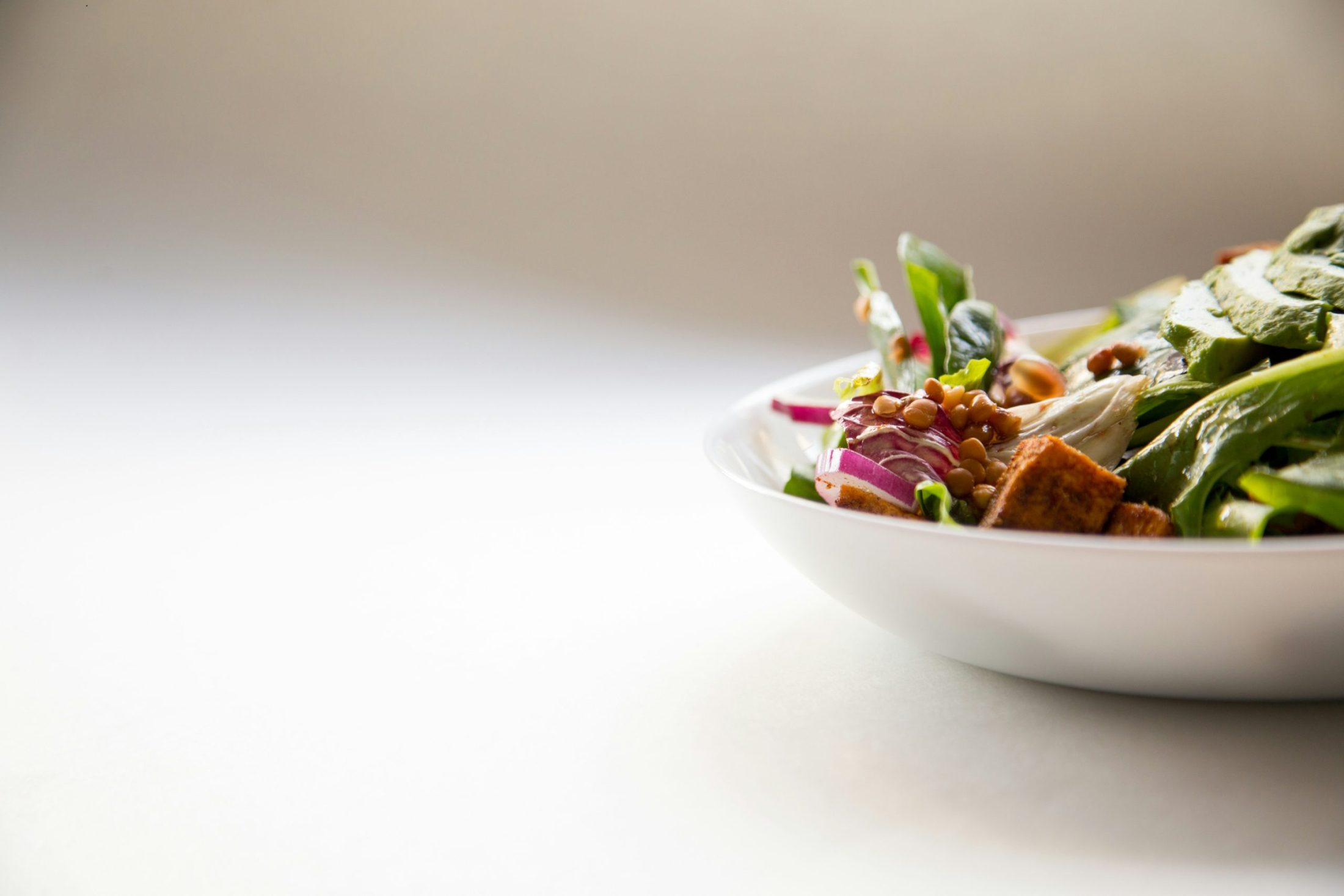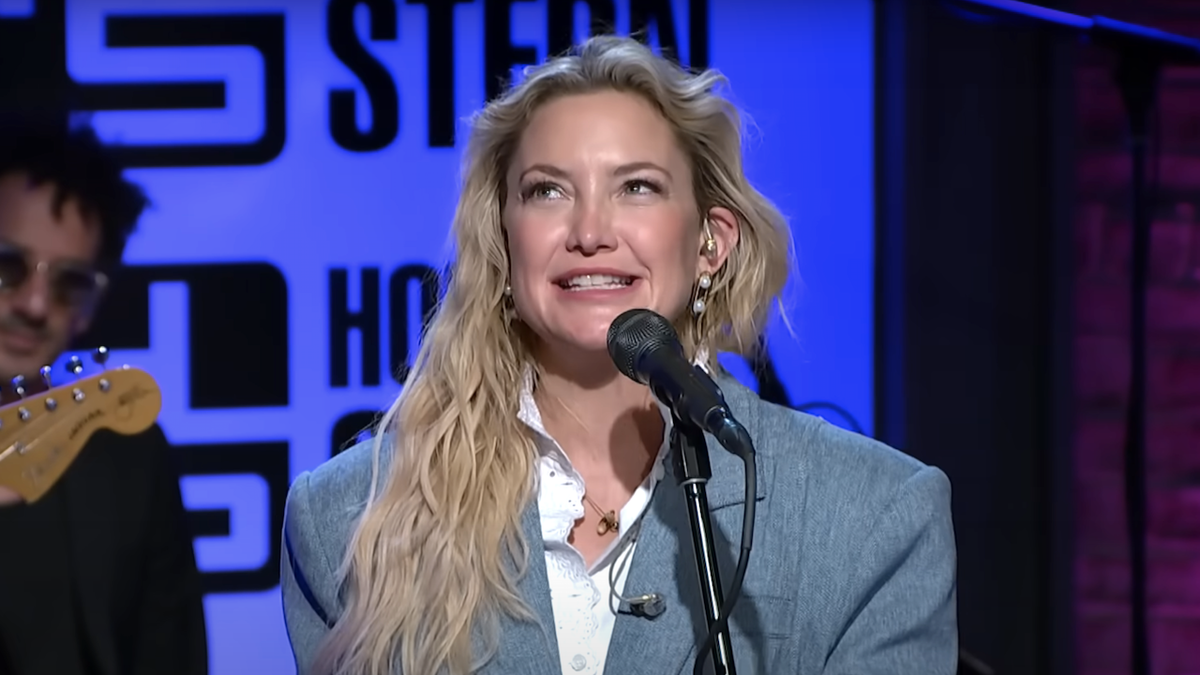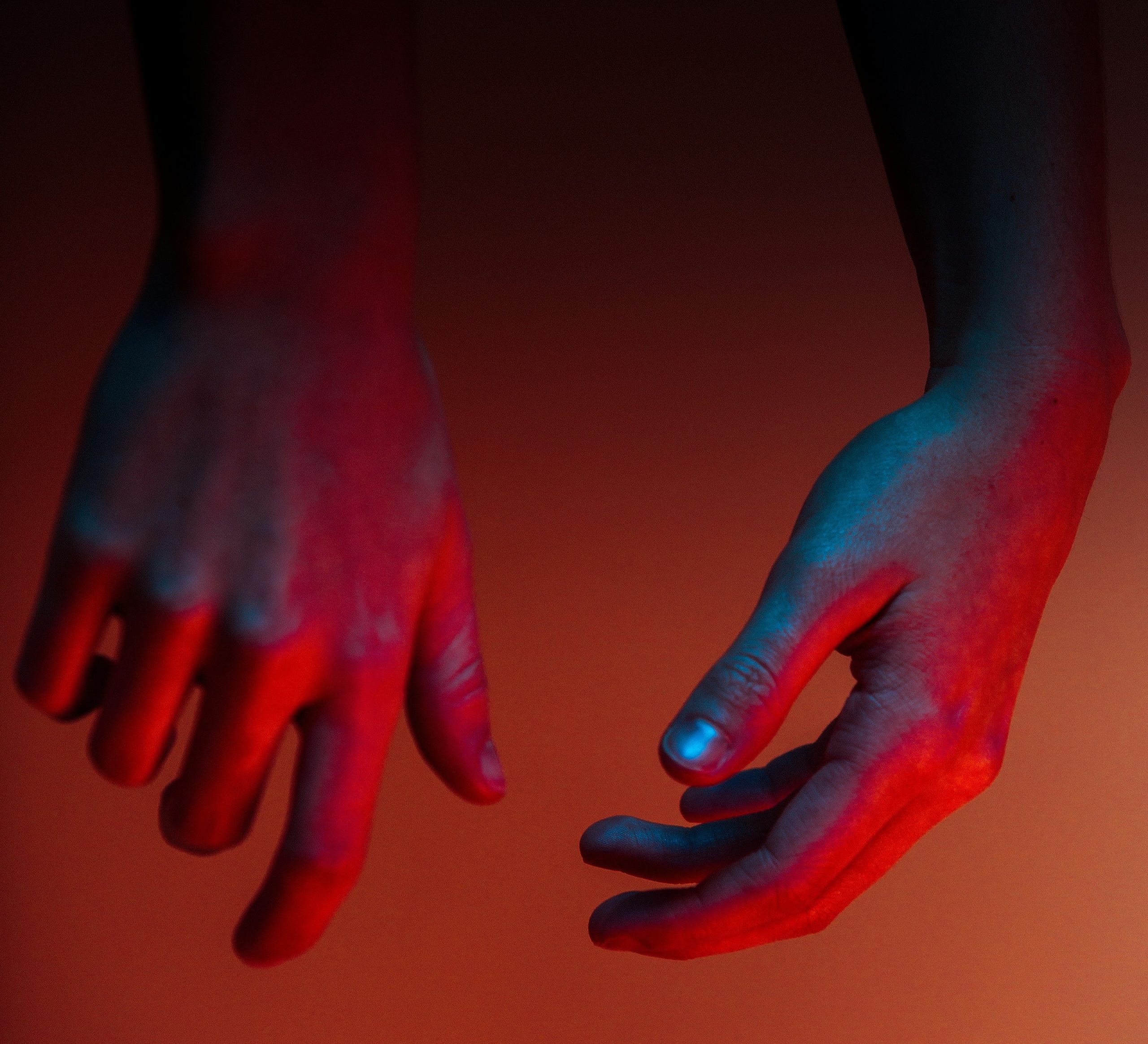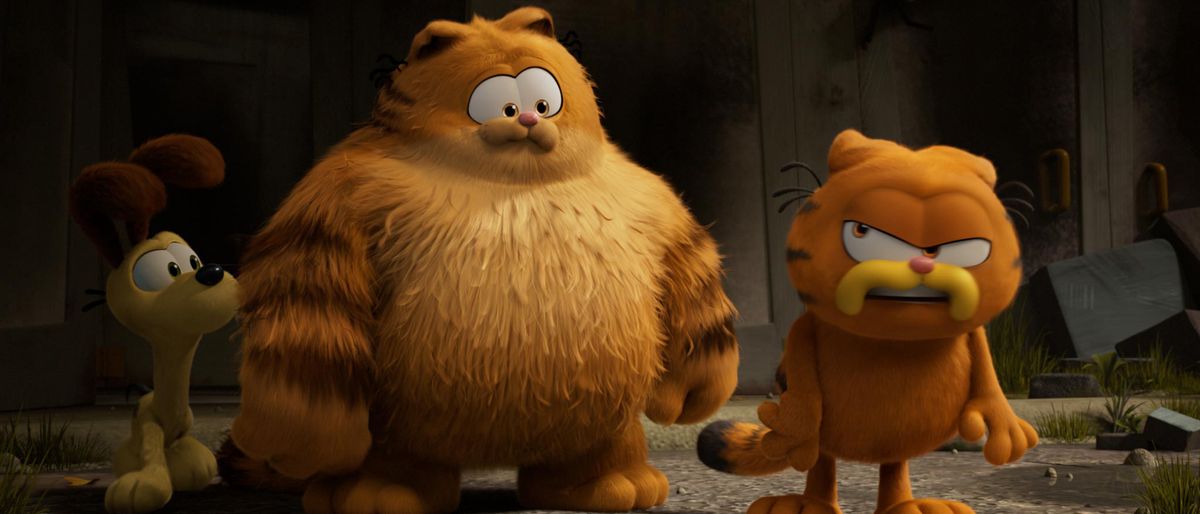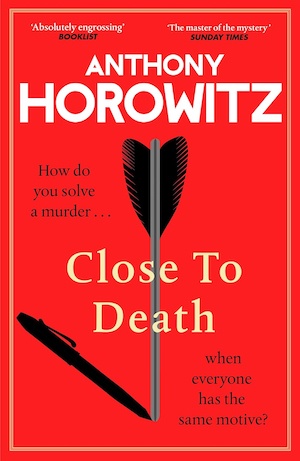“A Salad-Eating Competition” by Billy Lezra
THEY SAY NOTHING TASTES AS GOOD AS SKINNY FEELS, BUT
After Kate Baer
have you tried duck-egg soaked brioche French toast, golden crisp edges doused in caramelized maple syrup? have you licked a spatula coated in vanilla bean whipped cream? have you soaked up oceanic Pinot Grigio brine with toasted baguette after polishing off a bowl of mussels? have you allowed the thick cream of drinking chocolate to coat your tongue? have you baked the strawberry rhubarb pie passed down from your great-grandmother? have you dined solo in Rome, read love poems to yourself over a plate of pasta carbonara with a glass of chianti? have you dipped buttered toast slathered with apricot preserves in black coffee? have you licked lavender honey off a lover’s thumb? have you finally renounced deprivation in the name of pleasure and celebration?
– D. Coffyn
I see this poem on Carmen Maria Machado’s Instagram story, black words set against a white square. I picture the chocolate, the lavender honey, the French toast, and try to recall what sweetness feels like on the tongue; it’s been so long since I ate for pleasure the thought seems strange, out of place, like a rat in a bowl of sugar. I read and re-read the poem over the sound of my seething stomach. I have not renounced deprivation in the name of celebration: if I eat for pleasure, if I eat until I’m full, I’m convinced I will feel atomic levels of pain.
Did you know that hungry people feel less pain? I mean this literally: hunger activates a neural pathway that inhibits the perception of and response to pain. So I don’t eat brioche or butters or creams or custards or anything that makes me flush, full, or moan. Instead, I eat leafy things, watery things, bland things. I am always hungry. I am always hungry. And I rarely feel pain.
Today I have an appointment with a blood specialist, or as my friend/former boyfriend Journey calls him, “Docula.”
My protein levels are low, a marker of malnourishment.
“How old are you?” asks Docula.
“Thirty-one.”
“Do you eat well?”
“Yes.”
Docula asks me to stick around so he can draw more blood and run a lipids panel.
I leave the office, promising to return for the test. I will never see this man again.
What did Docula say? texts Journey.
I respond with a GIF of a little black bat bursting into a vampire.
I am always hungry. And I rarely feel pain.
Memoirs and essays about eating disorders are often structured in redemptive narrative arcs: the writers describe the specific ways they starved or purged until their enamel wore down and their hearts almost stopped. Then they begin to recover, sometimes against their will, and from this place of tentative health, they write. I can’t find myself in these narratives. When I read them, I wonder whether the authors think about readers like me, us parched sponges who absorb “recovery” literature for tips and tools to starve beautifully, to starve well.
I won’t disclose my anorectic methods here, because I don’t want this essay to double as a manual/weapon. This is not an essay about redemption: it’s about resisting recovery the way someone resists drowning—so violently I might drag my rescuer underwater, too.
Carl Jung suggests that intellectualization masks the fear of direct experience, so here I go. Etymologically, “recovery” comes from the Anglo-French recoverie. In 1530, recovery was defined as: “the act or power of regaining or retaking something lost or taken away.” By 1580, the meaning evolved to include: “the restoration from a bad to a good condition.” The problem with this definition is that it implies the existence of (and return to) a prior good condition, and for me, there was none: anorexia is all I remember. Six-year-old me basked in my family’s praise the summer I only ate stone fruit. Twelve-year-old me fasted with my mother, longing for the sharp shadows her cheekbones cast along her face. Fourteen-year old me got a belly-button piercing to celebrate shrinking into the body everyone around me encouraged me to have.
When I send an early draft of this essay to my friend Julia, a memoirist and therapist, she writes eighteen comments in my Google Doc. One asks: “Could there be room to discuss the pain these younger versions of you were experiencing/avoiding/absorbing?” The incisiveness of her question makes my eyes sting; I interpret it as an invitation to excavate the roots of my anorexia. I resist. I wonder: do my particular pain-points really matter? I’m not interested in uncovering why I struggle to eat—I could come up with countless wounds and never touch clarity. I’m interested in that I struggle to eat, in the ways my pain presents itself rather than its reasons. But maybe Julia is right: maybe I have to discuss the pain in order to understand its anatomy.
I send a revised draft of this essay to my friend Charlie, a novelist. “Can you remember a time in which you ate for pleasure or joy?” they ask, over Zoom.
I drink my cold black coffee and shake my head.
Charlie readjusts their rectangular glasses and re-reads the etymology of the word “recovery.” The restoration from a bad to a good condition.
“If you can’t return to a previously good condition because that condition never existed, you may have to radically imagine what recovery could look like for you,” they say.
Imagination, as in the ability to project myself into the future, is precisely what I lack. I feel engulfed in a cloud of marine fog so thick I can’t see my own hand, let alone a future recovered self. And in order to recover, shouldn’t I want to recover? I don’t understand why I should want to recover from a condition that has helped me survive. Almost everything I rely on within myself loops back to anorexia, the way rivers eventually snake into seas. I depend on my high pain tolerance, on my obsessive thinking, on my capacity to endure discomfort; I don’t know how to live without the vigilance that runs through my body like an electric circuit. And by that I mean: I am certain I will die if I recover from this illness that could kill me.
Once, when I was twelve, I didn’t register the furious lurch in my mother’s eyes before we got in her green Volvo. You should have seen this coming, I thought, as we careened into the side of a tunnel, as my ribs cracked, as her nose spewed blood all over the airbag. You should have known she was too upset to drive. To be unalert has meant to be in danger: my survival has required constant watching, watching, watching. And to make the watching bearable I depend on disembodiment: for me anorexia was not about becoming a river of bones—I wanted to feel like steel, wood, ice, a nerveless membrane.
In another comment, Julia writes, “I must ask: do you want to feel like a nerveless membrane because your mother is a bundle of nerves without skin?”
I read this question and wonder: how much of my personality is reaction against my mother? She explodes, I implode. She attacks others, I mutilate myself. She cries thick tears, I swallow the salt. But also: we both drank; we both got sober. We both smoked blue American Spirits; we both quit. We both starved; I still starve. And who am I kidding: I also attack others, I also explode, I too am a bundle of nerves. That which you flee from finds you.
In “There once was a girl,” Katy Walmdan writes: “Anorexics are convinced that they are hideous, bad, and unlovable. At the same time, they are constantly soliloquizing about their sacrifice, their nobility, their ethereal powers.” I’m not convinced I’m hideous, bad, or unlovable, but I don’t believe I am beautiful or sweet or loved—to be loved, you have to be seen, and I don’t want to be looked at. Maybe this is why I disappear.
Glennon Doyle, a writer in recovery from anorexia, suggests that starving your body will also annihilate your intuition—the little voice that warns you against a dangerous person or situation. To me this rings false: the hungrier I am, the more vigilant I feel. Hungry me sees sunlight as it threads through the hairs of a stranger’s arm; hungry me sees a man in a green leather jacket drop a pill in a younger woman’s drink on the other side of a bar; hungry me warns the bartender; hungry me feels like Spider-Man.
“Could this be because when we are starving we are in survival mode?” asks Julia.
“Are vigilance and intuition the same thing?” asks Charlie.
Here, am I soliloquizing about my ethereal powers?
“You can eat and feel like Spider-Man, you know,” says my therapist, Anne. “Think about how much Spider-Man ate.”
I glance around Anne’s office, at the yellow walls, at the framed black and white pictures of sailboats, and try to remember the Marvel movies, the ones with Tobey Maguire, Andrew Garfield, and Tom Holland.
I am certain I will die if I recover from this illness that could kill me.
“Are there any scenes in which Spider-Man actually eats though?” I ask.
“Go re-watch the movies.”
I don’t re-watch the movies, but I Google “does Spider-Man eat?”
Video after video pops up: Spider-Man eating donuts, pizza, burgers.
I report this to Anne.
“And what does this mean to you?” she asks.
“It means that a fictional character eats.”
Anne’s lips stretch into the smirk that says: you’re an unending asshole.
“I honestly don’t care what Spider-Man does,” I say. “You’re not going to convince me that I’ll somehow be more vigilant if I’m full.”
She leans back into her blue armchair. “I’m not trying to convince you of anything. I just want you to consider that your experience of life could be infinitely better than the one you’re having now.”
“I doubt that.”
“That’s the anorexia speaking,” she says.
“But when is the anorexia not speaking?”
“You have another self that isn’t sick.”
Esmé Weijun Wang’s words come to mind: “when the self has been swallowed by illness, isn’t it cruel to insist on a self that is not illness?”
On Instagram I follow an account called “kids eat in color.” The person who runs it is a nutritionist who teaches parents how to help their kids build a positive relationship with food. One of the most important strategies is to serve dessert with the main meal: jelly beans along with pasta, a slice of cake next to a piece of chicken, sugar cookies with steamed broccoli. This presentation is meant to erase the arbitrary binary between “healthy” and “unhealthy” foods. The account also discourages the use of words like “good” and “bad,” as the distinction moralizes the value of one kind of food over another. Instead, parents are encouraged to explain nutrition in ways kids will understand, for example: “red food gives you a strong heart, orange food helps you see in the dark, yellow food helps your body heal cuts.”
“You can re-parent yourself, you know,” says Anne, when I tell her about this account.
“If you make me hug my inner child one more time I’m going to freak the fuck out.”
She reaches toward the table on her left, picks up a tin of Pringles, sour cream and onion, and offers it to me: an invitation, a threat.
Unhealthy, screams my brain. Bad.
I decline.
Online, I indulge—I follow creators who cook and eat things I want but do not have. On Youtube, I consume video after video of “what I eat in a day” vlogs. As I watch people devour breads, burgers, pancakes, cuts of Wagyu steak, tacos, and cake, so much cake, I wonder: how much of this is true? Are they doing this for the camera or is this really what they eat in a day? On Instagram, I follow bakers who create uncanny cakes that look like high-heeled shoes, mops, coffee-cups. I also follow “miniature cooking” pages in which people use little knives to cut minuscule chicken breasts and sauté them on palm-sized stoves. Someone anorexic had to come up with this shit, I think, as I watch huge hands fix tiny meals.
I submit a draft of this essay to my graduate writing workshop. One of my classmates wants to know: what do I feel as I watch these videos, while I digest all this food porn? Titillation? Hunger? Thirst? No, all I feel is curiosity, perhaps a little envy: do some people really eat whatever they want, whenever they want, without a second thought?
Offline, I feed everyone I love. When friends come over, I place four kinds of cheese on the corners of a cutting board—goat, gouda, jalapeño cheddar, brie. I stick special little knives with colorful handles—red, orange, yellow, turquoise—into each mound of cheese. In the center of the board I arrange a charcuterie flower, petals of pepperoni, cured ham, chorizo. Between the cheeses and meats, I place basil leaves, dark seed crackers, strawberries, blueberries, almonds, walnuts, pickles, puckered black olives, squares of chocolate. Before my guests arrive, I take a picture of my masterpiece and post it on my Instagram story and write something inane like cheeseboards are my love-language (can something you deprive yourself of really be a love-language?).
I never eat before coming to your house, my friends say. You feed me so well.
Their comments make me prickle with pride.
“Why is it so important for you to feed others?” asks Anne.
“I want people to leave my house feeling better than when they walked in.”
“But why?”
“It makes me feel happy,” I say, when what I really mean is: it makes me feel full.
“Folks with eating disorders often love to cook,” says Anne. “It’s like a decoy. If you appear to engage with food, your friends won’t notice your eating patterns.”
“They notice.”
Some friends notice gently; they slide snacks in my direction and offer to cook me dinner.
Some friends notice loudly; they ask me when I last ate, concern glued to their faces the way honey sticks to skin.
“How does that make you feel? That people notice?”
“I don’t care. You’re probably going to say that this is the anorexia talking.”
“No. People usually try to keep eating disorders hidden because they’re ashamed.”
My chest puffs up with self-righteousness. “Everyone struggles with something right? If someone judges me they can go be ashamed of their own life.”
“Setting shame aside for a minute, do you ever think about how your anorexia makes other people feel?”
My chest deflates.
Back when I lived with Journey, back when I was nineteen and he was eighteen, back when my mother moved from California to Spain, where we’re from, I started to eat again. Once there was a sea, a continent, and multiple time-zones between my mother and I, once she could no longer summon me with a text or a call or a facial gesture, I ate salt and vinegar chips smashed in turkey sandwiches, home-made donuts filled with raspberry marmalade and coated in powdered sugar that dusted my eyelashes and cheeks, chocolate oreo milkshakes so thick the cream barely passed through the straw. Once my mother moved away, I felt like I could rest.
For months, Journey and I hosted weekly brunches and parties in our tiny studio. The heat of people’s bodies warmed the periwinkle room, friends slept over on our leopard-print carpet. This was my first taste of an adulthood untethered from my mother. Everything felt fun and spacious, but as time passed, I began to experience flashbacks, night terrors, intrusive thoughts, full-body sweats. My eyes and fingers twitched as I imagined the sound of my mother’s anger and sorrow, of my phone ringing incessantly with her calls. I stopped wanting to be full; I felt too afraid to rest.
Soon, alcohol replaced food. Instead of eating, I drank vodka mixed with pulpy orange juice. At night, I watched The Real Housewives while Journey played Grand Theft Auto. Zoning out next to him felt soothing, as if we were floating on two separate rafts in a sea of screens, fingertips touching.
One night, Journey came home with three styrofoam containers brimming with Indian takeout. The scent of masala and cardamom filled the room. My eyes watered, my stomach growled. I could have thanked him for buying us dinner.
“This is like the third time you’ve had takeout this week,” I said instead.
“So?” Journey asked, as he spooned aloo gobi onto wedges of garlic naan.
“Don’t you think you should be eating more salads?”
The corners around his green eyes crinkled with confusion.
“What are you trying to say?” he asked.
I wasn’t trying to say anything. I was saying it. Eat less.
“I eat a salad like every day,” I said.
“What do you think life is?” Journey asked. “A salad-eating competition?”
I laughed, caught off guard.
He laughed too, and finished making his plate.
I don’t remember eating.
The more space my anorexia takes on the page, the hungrier I feel
Now, I wonder how many casually cruel things I said to Journey, how often I made him feel self-conscious about how much he was eating, what he was eating, that he was eating. All along, I’d wanted to believe anorexia was a problem between myself and I, not a double-edged sword that would cut anyone who tried to get close. I feel shame, sharp in my chest.
I call Journey.
“I owe you an apology,” I say.
Back to intellectualizing: Amanda Holmes writes that “shame” derives from the Goth word scham, which translates to “a covering of the face.” Shame, then, is the urge to hide, the act of hiding, of becoming invisible. Conversely, “write” derives from Old English writan: “to outline, to draw the figure of.” If shame is to cover, to write is to uncover—to expose. In her essay “Writing Shame,” Elspeth Probyn draws a connection between the act of writing and the experience of shame. She suggests that writing and shame go hand in hand because there is “a shame in being highly interested in something and unable to convey it to others.” As writers, we are required to wrestle with the question: what if no one cares about what we care to uncover? Or worse, what if people reduce and reject what we disclose?
The week I publish my first essay about anorexia, I meet up with a friend, another writer, in a coffee shop in downtown Los Angeles. The winter sun is pale, the air spiked with January’s chill.
“I read your essay,” my friend says, as he stirs brown sugar into his lavender latte. “I would never write about what you write about. I wouldn’t want my deepest and darkest wounds out in the world.”
The idea that anorexia is my deepest and darkest wound makes me chuckle.
“I’m fine with it.”
“Do you worry people will judge you?” he asks.
“For having an eating disorder?”
“For writing about it. For navel-gazing.”
I sip my coffee.
My friend’s comment reminds me of how, once, in an undergraduate writing workshop, my professor announced that he was tired of reading “navel-gazing work” when one of my classmates submitted an essay about anorexia. Thirty minutes later, this professor called a (male) writer’s description of heroin addiction an “existential reflection.” I wanted to snap and say that addiction and eating disorders are cousins, that starving and binging and purging produce emotions the body learns to depend on, that anorexia has the highest mortality rate of any psychiatric disorder. But my second-hand shame was so immense, I said nothing.
As my friend’s comment lingers in the dead air between us, part of me wants to pull my sweater over my head, cover my face, and hide. The other part of me wants to tell him to go be ashamed of his own life, that, as Melissa Febos writes, “navel-gazing isn’t for the faint of heart,” that I am doing my best to make sense of an illness that feels like a vacuum, with no discernable beginning or end.
I tilt my head toward the sun and stretch my arms downward; my collarbones crack.
“What are you working on?” I ask instead.
A few days after I submit the final draft of this essay to my graduate writing workshop, I receive an email from one of my classmates. If you show up to workshop without that goddamn epic cheeseboard we are going to have a problem. The message makes me cackle. Later, over text, my classmate tells me that my work made her hungry; I feel relief. The more I write, the more space my anorexia takes on the page, the hungrier I feel, too. I keep snacks at my fingertips as I type: sour things, sticky things, spicy things. On heavy writing days, I take twenty-minute cat naps every three hours and dream that I spit out my teeth one by one. Google says dreams of teeth loss symbolize a loss of control, of power, the death of an important relationship. If my anorexia dies, who gets to live? Maybe this is a stupid question because the answer is so obvious—I get to live—but what I really mean is: how am I supposed to trust a self I haven’t met?
My last workshop takes place in a bright classroom with a rectangular table. I am not allowed to speak while eight writers comb through my work. A clear plastic bag full of chocolate-covered espresso beans sits a few inches away from me; usually I never touch the beans, today I eat three. One person says my etymological meditations sound like bad liberal arts academic discourse. Another person says all my writing about writing is self-dramatizing. Someone else likens it to an “open corpse” style, in which the writer vivisects the essay to reveal its bones, guts, organs, tissue. The idea that a piece about anorexia is an open corpse amuses me. I take notes. At no point during the workshop do I feel shame, just heat; the skin on the back of my neck becomes red and flaky as if I am sitting beneath a fierce ocular sun. Once the workshop is over, my professor asks if I have any questions. I say no.
The day I drafted the first page of this essay, I saw the potential for an echo. My trip to Italy was already booked, so I made a decision: on my last day in Rome I would eat pasta carbonara. Not to assert recovery, not because I have successfully renounced deprivation in the name of celebration, but because I am a glutton for symmetry. The opportunity to open and close the essay with carbonara would be too good to pass up, regardless of how I felt about the actual eating.
I ate outdoors, in a restaurant that served its pasta in aluminum pans on tables with translucent plastic tablecloths. The spaghetti was thick, eggy, covered in cheese; tiny pools of bright red oil dotted the carbonara sauce. It would be disingenuous to claim that I ate with pleasure or that I enjoyed the wheat, cream, grease, pecorino. The truer truth is that I ate with fear and delight and curiosity, and that when I finished I was dizzy and disoriented and worried but sated. For a moment, I felt proud of myself: there I was, in Rome, listening to church bells toll in a plaza tinged fuschia by the setting sun, butter flecking the corners of my mouth. But I also knew this wasn’t recovery: it doesn’t really count if you eat for the story, just to say you did. But it also doesn’t not count.
“How was your trip?” asked Anne, once I returned.
I pulled out my phone and showed her a picture: my aluminum pan, half-empty, rich cream splattered on metal.

